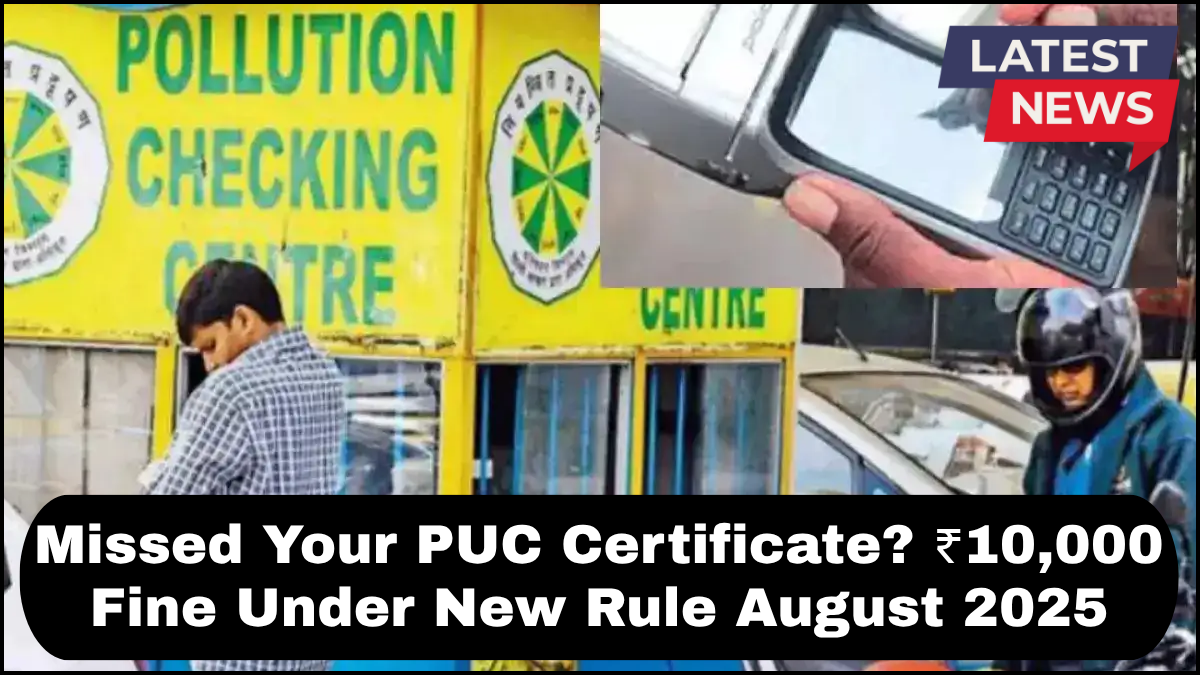Starting August 2025, vehicle owners in India face stricter penalties under the Vehicle Pollution Rules India framework. The latest revision enforces a significant ₹10,000 fine for failing to carry a valid PUC Certificate—a measure aimed at curbing rising air pollution and ensuring environmental accountability. Whether you drive a two-wheeler, car, or commercial vehicle, ignorance of this rule could hit your wallet hard.

Here’s what you need to know—and do—to avoid the PUC Certificate Fine 2025.
What Is a PUC Certificate?
The Pollution Under Control (PUC) Certificate is a mandatory document for all vehicles on Indian roads. It certifies that a vehicle’s emissions are within permissible limits as per the standards set by the Central Pollution Control Board (CPCB).
A valid PUC certificate includes:
-
Vehicle registration number
-
Date of the emission test
-
Emission readings (CO, HC, and particulate matter)
-
Validity period (usually six months for most vehicles)
Without this certificate, a vehicle is considered non-compliant under the Vehicle Pollution Rules India.
What Changed in August 2025?
The new rule introduced by the Ministry of Road Transport and Highways (MoRTH) in August 2025 significantly raises the fine for missing or expired PUC certificates from ₹1,000 (for first-time offense) to a flat ₹10,000, regardless of whether it’s your first or subsequent violation. This move is part of a broader crackdown on vehicular pollution in urban zones.
Additionally:
-
Enforcement will be digital. Traffic police and road transport officers can scan your vehicle number and detect non-compliance instantly via central databases.
-
Automated e-challans will be issued in many states without the need for physical checks.
-
Repeated violations could lead to suspension of registration or driving license in extreme cases.
Why the Strict Fine?
India is home to some of the world’s most polluted cities. According to a 2024 report by the WHO, more than 20 Indian cities were listed in the top 50 for poor air quality. The transport sector alone contributes nearly 30% of urban air pollution.
The steep ₹10,000 PUC Certificate Fine 2025 is intended to:
-
Encourage timely emission checks
-
Promote vehicle maintenance
-
Phase out older, polluting vehicles
-
Support India’s broader clean air initiatives like the National Clean Air Programme (NCAP)
How to Get or Renew Your PUC Certificate
Getting a PUC certificate is a quick process and typically takes under 10 minutes. Here’s how to do it:
-
Visit an Authorized PUC Center
These are usually found at fuel stations or RTO-approved testing centers. -
Emission Test
A probe is inserted into your vehicle’s exhaust pipe to measure emissions. -
Receive Certificate
If your vehicle passes the test, you receive a printed certificate on the spot. Many centers now offer digital copies as well.
Alternatively, you can book online appointments through the Parivahan Sewa portal in select cities.
Penalty Triggers to Watch Out For
Avoid the ₹10,000 penalty by staying aware of these common compliance lapses:
-
Expired certificate: Many forget that the certificate typically expires every 6 months.
-
Change of ownership: If you’re buying a second-hand vehicle, verify the PUC status.
-
Missing physical or digital copy: Always carry a valid copy—either physical or on Digilocker.
Tips to Stay Compliant
-
Set a reminder for your next PUC renewal date.
-
Choose SMS alerts if available at your testing center.
-
Get your vehicle serviced regularly to ensure emissions stay within limits.
-
If you’re planning long-distance travel, double-check your PUC status before hitting the road.
Frequently Asked Questions (FAQs)
1. What is the fine for not carrying a PUC certificate in 2025?
As per the new rule effective August 2025, the fine is ₹10,000 for not carrying or having an expired PUC certificate.
2. Is a digital copy of the PUC certificate acceptable?
Yes. A digital PUC certificate stored in the Digilocker app or on your phone is legally valid across India.
3. How often should I renew my PUC certificate?
Typically every 6 months. However, this may vary depending on your vehicle type and age.
4. What happens if my vehicle fails the emission test?
You must get the necessary repairs done and retake the test. Until then, you cannot get a valid PUC certificate and risk penalties if caught driving.
5. Does the ₹10,000 fine apply to all vehicles?
Yes. The rule is applicable to all private and commercial vehicles, regardless of category or engine size.
click here to learn more